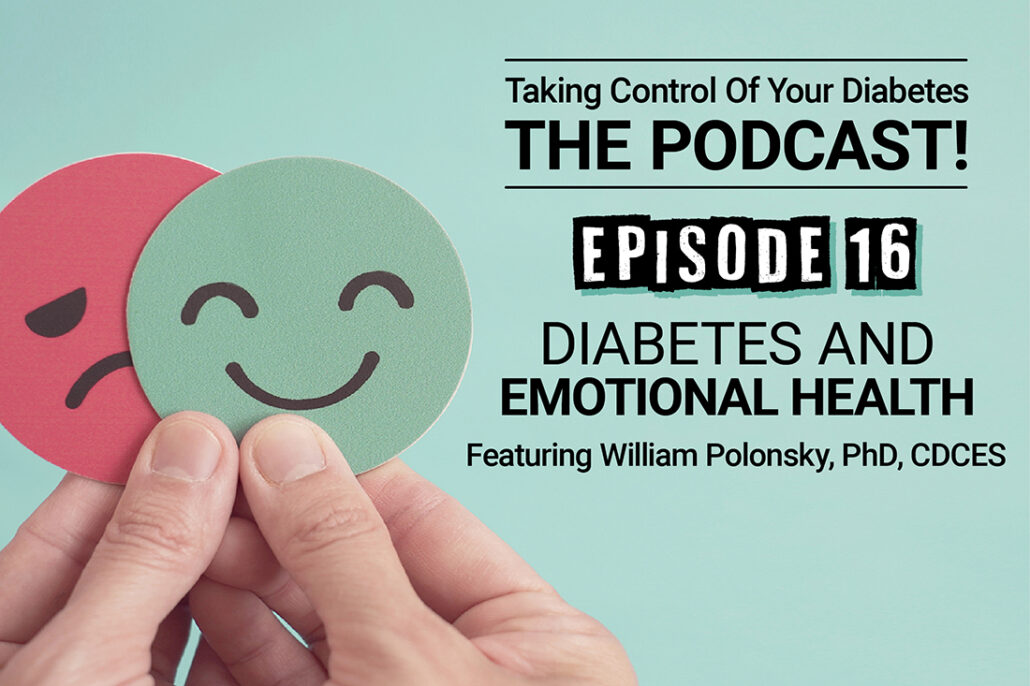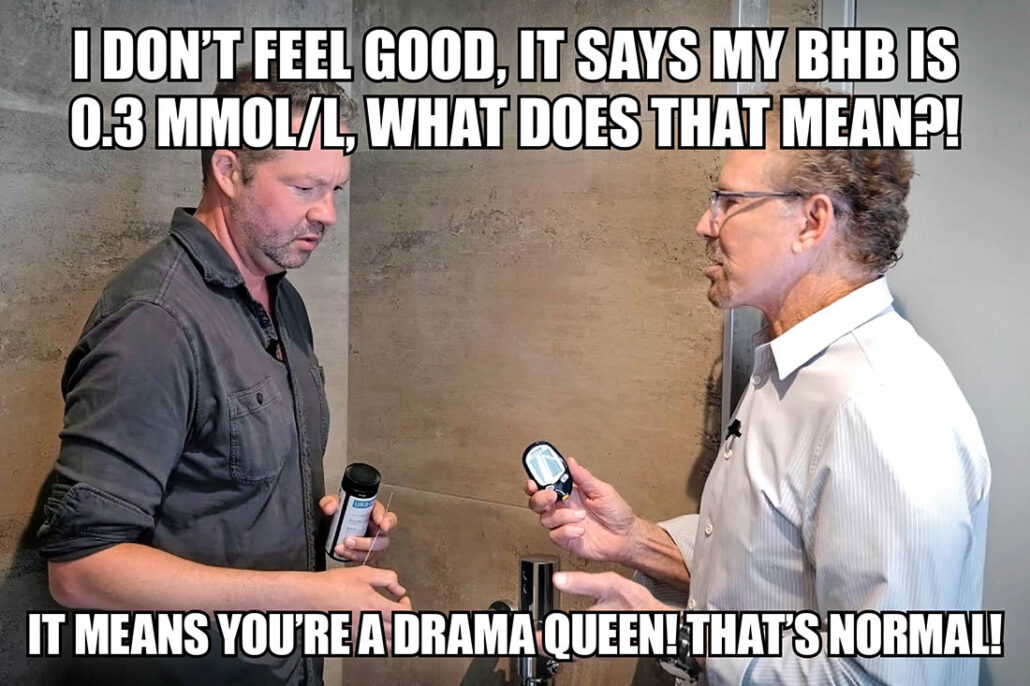Treating Hypoglycemia: How To Handle Low Blood Sugar Emergencies
Learn from endocrinologists who live with type 1 diabetes Dr. Steve Edelman and Dr. Jeremy Pettus as they share their personal hypoglycemia experiences and essential treatment strategies.
In this video, you will learn about the following:
✔ Real-life emergency stories from endocrinologists who live with Type 1 diabetes
✔ Why low blood sugar can happen to anyone with diabetes, regardless of experience or expertise
✔ How to properly prepare for hypoglycemia with strategic glucose placement
✔ The critical importance of having glucagon on hand, even if you’ve “never needed it”
✔ The most effective methods to treat low blood sugar and prevent dangerous situations
Hypoglycemia (low blood sugar) is an inevitable reality for people with diabetes, even affecting experienced endocrinologists who manage the condition themselves. In this discussion, Dr. Steve Edelman and Dr. Jeremy Pettus share their frightening personal experiences with severe hypoglycemic episodes—from being trapped in an elevator without glucose tablets to accidentally taking 40 times the normal insulin dose. Their stories highlight why preparation is crucial: keeping fast-acting carbohydrates accessible everywhere and having glucagon readily available can literally be lifesaving. The doctors emphasize that while new glucagon formulations are easier to use with a two-year shelf life, many patients don’t carry it because they “haven’t needed it yet.”
Explore this topic more with our podcast episode!
The Emotional Side of Diabetes, with Clinical Psychologist Dr. Bill Polonsky
Managing diabetes isn’t just about numbers—it’s also about handling the emotional toll that comes with it. In this episode, Dr. Steve Edelman and Dr. Jeremy Pettus sit down with leading diabetes psychologist Dr. Bill Polonsky to unpack the mental health side of living with diabetes. From feeling overwhelmed by constant decision-making to dealing with burnout, they explore the real-life emotional challenges people with diabetes face every day. You’ll learn how to recognize the signs of diabetes distress, how it’s different from clinical depression, and where to find support that actually helps.
Emotional Health and Diabetes, with Clinical Psychologist Dr. Bill Polonsky
Diabetes is an overwhelming condition and emotional issues are extremely common for people dealing with diabetes day in and day out. So why is emotional health rarely discussed as it relates to diabetes? We’re sitting down with Clinical Psychologist Dr. Bill Polonsky to talk about the most common emotional issues people living with diabetes face, how to identify diabetes distress vs. depression, and what you can do if you’re feeling overwhelmed dealing with your diabetes.




I was shopping in Boston and felt a low BS about to happen. I pulled over (double parked) in front of a small shop. I left my car w/ hazards on, $20 bill in hand and asked the clerk where is the orange juice. He noticed I was pale, sweating and slurring my words. He went and got the juice and that was all I remember until I woke up in Boston Medical Center. My BS was 19. I asked “where am I”? The nurse replied “Boston Medical Center”. I screamed “Whaat?” I live in California! But it took me awhile to come back around
😳 That’s a scary one for sure.
I used to take Levemir twice daily at 7a and 7p. It only lasted about 12 hrs in my body because I was on a low dose. I was planning to sleep in but I knew I needed to take the Levemir at 7a. I accidentally took my humalog instead but didn’t realize it. I went back to sleep. I didn’t wake up until my husband telephoned me from out of town. I had been dreaming about helping recently dead people across the veil into the afterlife. Once I woke up I realized that I was low. I ate some glucose tabs at my bedside and then stumbled into the bathroom to check my BG. It was in the 20s. I was grateful that my husband happened to call at the right time so my dream was only a dream!
Wow, that is quite a story. Thank goodness your husband called when he did!!!
I ‘ve had a few over the years, the worst was in my teens, I was so low I had a seizure and almost bit off my tongue. I was asleep and it was after a day of hiking, this was before any blood testing was available. My sister whom I shared a room with woke up my parents and they gave me the glucagon shot and I recovered but also vomited after the shot. The other scary one which I was conscious for, I was on a pump and was sick with the flu, I think I overdid my bolus as I had been stuck in the 200’s for a while, then I was heading down fast in the 30’s eating glucose but BG not going up, used the glucagon and it was still not going up, my husband drove me to the hospital, but I did not want to be admitted and sat in the parking lot for about a half hour before it started going back up.
Thanks for sharing your stories, Sandy. Both very scary situations indeed.
I had two wrecks and both times my sugar had dropped really quick and both times the police came, somebody else had called them. Once I hit a drinking bar , they were not open and just the owner was there, he had called the police. When they came they thought I was drunk had me handcuffed in the back of the police car and going to take me to jail. They would not let me check my blood sugar or get anything from my purse to eat. I had a diabetic medical bracelet on, which I have always worn and tried to show it to them. I was not taken to jail thank goodness another police officer came and he was my neighbor when I was younger and remembered I was a diabetic, so I was saved from going to jail and the other cops did not say they were sorry or apology to me or nothing. I was also in another wreck and the police did the same thing to me again. They thought I was drunk and had me handcuffed in the back of the police car and this time the ambulance came and the EMT’s knew because they had taken care of me before. Those policemen would not let me take any glucose from my purse or anything because they said I was drunk. I have heard many times that when your sugar gets low that people think you are drunk, here it happened to me twice where the police thought I was drunk. Needless to say after this happened to me twice I do not drive anymore. I have terrible nightmares about these episodes that happened a long time ago, and I thank God I was not injured badly or did not hurt anyone else.
Thanks for sharing, Peggy. Those are very scary situations, and we’re so grateful too that no one was hurt.
Curious, when your real low and you take the glucagon,
1 do you take it all? Or can you take part of it ? Also, how much will it raise your sugar? I know if you’re real low you don’t care.
, you just want to get back to feeling better. I haven’t had it in a while, and when I did, I’ve never used it, but I’m going to order it now. Been type one since 16, I’m 71 now. I do try to always carry a sleeve of glucose tablets with me. I’m on the tandem pump with G6 transmitter
I take half the amount from the vial and syringe..0.5 mg
My day had started out with sugar uncontrolled & feeling exhausted (it was b4 pump & early dx days). I tried to correct it. I wanted to go shopping & decided to go a town over ALONE. I decided to grab lunch & eat on my drive, I forgot to bolus for it! Couple hours later I felt terrible… checked # & was near 300!! I panicked & corrected, or so I thought. Time goes by as I’m shopping I start to get woozy 🥴, I decide to head to pretzel shop for a soda.. as I’m walking I remember feeling like an astronaut floating, I stumble to the cart, mumble ” I need a coke!” Knees are jello, i say “excuse me I’m t1d having a BAD LOW” the next thing I hear is ” you hv to pay before I can giiii” & boom I passed out on the cart!! Come to find out supar jst dropped SUPER fast & was in 40s!! The next thing I know I’m w mall authorities asking who,what,when, where!! My hubs was working in our town, parents out of town sister out of town, the ONLY family tht was free to help me was my brother inlaw, he drove to get me & set me up at home to rest. I swear getting a pump & Dexcom has changed my life!! I’ve had pump for 19yrs!!
Wow, what a story! And yes, CGMs and hybrid closed-loop systems are life savers!!
Don’t go out of the house without candy in my pocket and purse full of candy and packets of sugar . Also, keep small zipper bag of candy in the car armrest and sometimes a bag of pretzels . A can of juice in the cup holder for just in case traffic jam on the highway.
I recommend using two different colored small zippered bags for different kinds of insulin pens.
It’s also useful to record a note on Dexcom app on phone how much of which insulin is taken at what time.
All GREAT ideas, Harriet! Thank you for posting!
These stories are very helpful. I was a Type 2 Diabetic for close to 30 years and have recently transitioned to a Type 1 Diabetic. It has been a whole new ball game. I have to watch my blood glucose readings more closely and more frequently. And when I leave my house I have to be prepared to treat low blood sugars with crackers or glucose tablets.
Yes, there is a lot to learn, but it sounds like you are diligent and setting yourself up for success as best you can! 🙂
I hit the floor at Whole Foods while shopping with my husband. I was so low that I was unable to bring up my glucose fast enough to not pass out. I spent 3 nights in the hospital. That feeling of being shaky and having a low BG is scary.
It IS so scary. So glad you are okay.
Have had Type 1 since 1987. We were traveling in Italy where my husband was giving a talk in a little town called Fermo. Staying in a very old Casa all doors were locked with huge iron keys. Seeing the generous breakfast of chocolate croissants, I really loaded up on the insulin so I could dig in and enjoy. Husband left to give talk, and then I tanked. I couldn’t find those door keys and was locked in, and unable to locate my handbag with glucose. Last thing I remember was being unable to see but able to hear birds through the open window. Before passing out was able to text HELP to my husband, who left mid-talk and raced back to help. Luckily the owners of the Casa were physicians and knew what to do next. Sigh – haven’t really been a great traveler to foreign lands since – fear can be a real buzz kill.
That’s the truth. Thank goodness you were in the capable hands of physicians…lucky indeed. So glad you were okay!
My experience with low blood sugar has always happened overnight. I’m Type2 diabetic since 1979. Had an absolutely dreadful doctor who had put me on Glumetza that made me sick every night from 11pm to 1 or 2 am. She had me on 500mg 4 times a day. I decided to change doctors and went to a metabolism clinic. They put me on insulin. This is when I started to experience low blood sugar from time to time. Fortunately, I wake up when this happens and have grape juice boxes handy to drink. I don’t usually need to drink the whole box, but stay up and check my blood sugar in 15 minutes to make sure it is in a good range.
Very smart! If you don’t already have a CGM, you may want to consider getting one, but it sounds like you have a good system in place right now. 🙂
I would love a video of how to use glucagon.
Hi Clodene,
We have a video on glucagon here:
https://www.youtube.com/watch?v=vsKKfq62Y8s
type 1 for 27 years. Worst low was overnight a few years ago. I was unconscious, but thrashing around woke my husband. When he couldn’t get a response he checkd my BG which was 21. He panicked, forgot about my glucagon and started force feeding me juice. As i was coming around, he was telling me what happened while our Basset Hound mix (Elvis) was very attentive to my neck. I came to the rational conclusion that Elvis could be my service dog until hubby advised that I had juice all over my neck. Elvis was again relegated to the sweet, but dumb as a rock category.
Haha! Well it was a good thought for a hot second! Glad you are okay. 🙂
After dinner one night I told my wife I was going to drive the truck around the block to charge the battery. It seems that I passed out a block away and drove about 3 miles into town, side swiping 3 cars before crashing into a ditch luckily there was a policeman following me and he called the ambulance. I don’t remember anything about that drive. Waking up in the hospital. Today I have the CGM and the pump that alerts me of highs and lows. Of course I always have crackers or candy available, and always double check my sugar levels before getting into a car.
CGMs and pumps with alerts are literal life savers. And double checking blood sugar levels before driving is ALWAYS a good idea. Thank you for sharing your story!
I was diagnosed in 1963 at 15 when all the diabetes education was: here’s a glass syringe, a stainless steel needle and NPH insulin that I took 1x per day (42 units. I still remember the dose)Oh, and don’t eat sugar unless you get shaky. That was Diabetes Ed 101. When I went to college I informed my roommate about the candy thing and she would watch me take my shot. Fast forward to the spring ( in Texas-hot!). our dorm had a softball game against another dorm and when we finished, everyone was hot and sweaty. I told my roommate I was going to sit down by the elevators to wait for it to come. I must have passed out! The next thing I knew, I was in my dorm room finishing up my second big Hershey bar and getting ready to eat a third. My roommate and friends had dragged me into the elevator, into the room and began feeding me Hershey bars. I guess I was just lucid enough to eat and swallow. The only thing I asked was how did I get here and how many Hershey bars had I already eaten? I loved chocolate ( to this day) and did not realize at that time that chocolate wasn’t the best choice for low bg. Those are the times that I look back and wish I could have enjoyed it more!
Well hopefully you enjoy it now! You were so smart to tell your roommates about your diabetes, and as you said, thankfully the chocolate was enough to bring your blood sugars back up! Thanks for sharing your story!
Camping in Santa Cruz with my daughter (high school at the time) and a couple of other Moms with their kids. We spent the evening at the Santa Cruz Boardwalk, riding carnival rides and eating carnival food. Since I ate several things that I normally do not eat, (the hot dog with ALL of the fixin’s, fried dough with whipped cream and strawberries, ice cream) I gave myself extra insulin. And since I did not normally eat this stuff, I also did not know how much extra I would need. With Insulin Resistance, I already go high quite easily, so I thought I needed more than I actually did, and took too much. By midnight, we were back at the campground, and I was starting to shake, rock, slur, not make sense. My daughter got really scared, and called 911. By 1:00AM, I had an ambulance on the dirt road in front of my campsite, with 2 EMT’s and a Park Ranger asking me who the president is, and if I knew where I was. I refused to go to the hospital, because I had already treated the low, and knew that my levels would be back up by the time I got to the hospital. So they made me sign some forms (refusing treatment) and went on their way. That really scared my daughter though, and after that, she wanted me to send her my numbers from my CGM.
Understandably so. It’s so so hard to know how to dose when you’re eating foods you don’t normally eat. So glad you were okay. 🙂